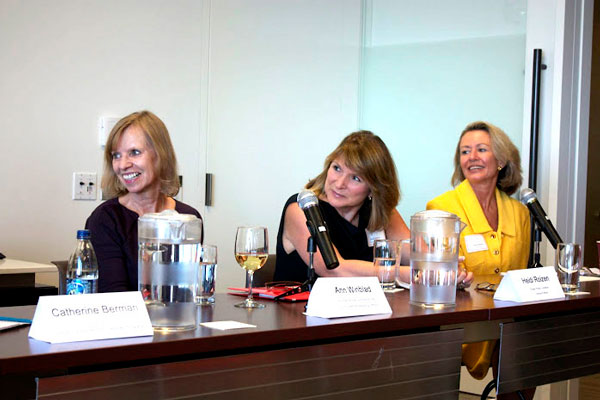Venture Capital Today: San Francisco is the Center of the Universe for Entrepreneurs
June 2012

Ann Winblad, Heidi Roizen, and Laura Roden, three pioneering venture capital professionals spoke to a large crowd of FWA members and guests on June 20th about some of the current trends in venture capital:
- Macro economics is always a concern to venture capitalists (VCs), not-withstanding the current slow recovery, the environment is good for VCs with Facebook’s recent IPO.
- Potential companies need $100m in annual revenue, independent directors, and a good CFO to go public in this environment.
- Private acquisition targets typically need a seven- year operating history and IPOs need at least that amount of time.
- The current VC market is overfunded in social networking; life sciences (excluding pharmaceutical) and wellness are underfunded.
- South America is the next hot region for investment.
- While VC IRRs are good (Five-year returns average 7% for 5-year funds), cash on cash returns are lagging, hindering capital reinvestment.
- Overlapping funds vs. serial fund raising is an - other factor drying up available capital.
- Crowd funding, angels, and micro VCs are not taking dollars away from larger VCs, but they consist of lower quality investors that lack the advisory services to develop leadership and increase the likelihood that the investor’s equity would prematurely need to be converted to cash.
Laura noted the post-recession risk-off trade shrank funds from $400m to $75m. External capital sources account for 72% of late stage funds and 38% early stage funds. Laura encouraged women interested in VC to take advantage of existing networks, including Golden Seeds, Springboard, and Astia.
Ann, a series A investor, talked about investing on a set of assumptions instead of facts, pattern matching, and the tendency of portfolio company demographics to mimic investor profiles. In the Bay Area, 86% of funds are still run by white males. Ann urged young women and FWA members to acquire dual degrees in finance and technical fields, pursue MBAs, stay involved with their undergraduate universities, and look to hire women entrepreneurs from outside the obvious schools.
Heidi said one’s social graph—in work and play— impacts VC job opportunities and investment opportunities. Referencing her entrepreneurship class for engineers at Stanford, Heidi talked about the relevance of soft skills in addition to leadership development and the teaching role a good VC partner plays. Mentorship and access are critical to advancing women in venture capital, according to Heidi, who encouraged FWA members to become financial experts on private company boards and mentor female entrepreneurs. — Contributed by Verity Chegar




